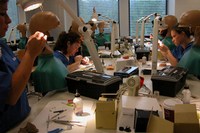Dentist Training
Dentist training programs teach dentists how to help individuals maintain and improve their oral health. They are trained to diagnose, prevent, and treat problems with teeth, gums or mouth tissue. They remove and replace tooth decay, extract, straighten or replace missing teeth, perform root canal therapy and repair damaged tooth structure.
Dentists also perform dental surgery on gums and supporting bones to treat gum diseases. Dentists are trained to provide instruction on nutrition, brushing and flossing techniques, the use of fluorides, and other aspects of good oral hygiene. They also administer anesthetics and write prescriptions for antibiotics and other medications as necessary.
Dentist training programs teach dentists in the use a variety of equipment, including x-ray machines, high and low speed drills, and other dental hand piece instruments such as mouth mirrors, probes, forceps, brushes, and scalpels. They are also taught regulatory standards, learning how to properly use masks, gloves, and safety glasses in order to protect themselves and their patients from infectious diseases. The goal of any accredited dentist school is to prepare individuals for licensure or certification in the field of dentistry.

In addition to private practice, dentist training programs offer excellent setting opportunities for aspiring dentists in the area of academics, public health, research, hospitals and the military. Academic dentistry combines teaching, research, community service and patient care in an educational setting, while public health dentistry focuses on community settings and promotes dental health, health policy development and disease prevention. There are also a number of opportunities for research and teaching within this industry and the opportunity to provide dental care in such environments as Native American reservations, the armed forces and federal prisons.
Research dentistry offers new knowledge and scientific discoveries that impact patient care. Some of the latest research that has improved patient care has included laser techniques used in dental procedures, dental implants to replace damaged bone and computerized x-rays. A career in research dentistry often requires an advanced degree or additional training beyond the dental degree. In a hospital setting, dentists can treat patients with medical conditions and disabilities alongside physician colleagues, often in operating rooms and emergency departments. Hospital dentists usually have a strong interest in medicine and collaborative care and have spent a year or more training in a hospital based setting after completing dental school.
Dentist
In the US, a dentist is qualified to practice dentistry after graduating with a degree of D.D.S. (Doctor of Dental Surgery) or D.M.D. (Doctor of Dental Medicine). In most countries, students complete at least 8 years of study (4 years at the university level and 4 years of doctoral training). At least 2 of the last 8 years must consist of practical experience working with patients in an educational setting. While dental schools may have their own specific requirements for graduation, they generally have similar program requirements for incoming students and ask that students apply for admission at least a year in advance of their planned enrollment date.
